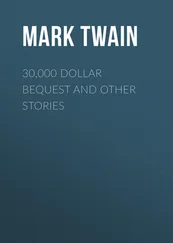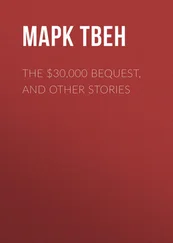Mark Twain - The 30,000 Dollar Bequest and Other Stories
Здесь есть возможность читать онлайн «Mark Twain - The 30,000 Dollar Bequest and Other Stories» весь текст электронной книги совершенно бесплатно (целиком полную версию без сокращений). В некоторых случаях можно слушать аудио, скачать через торрент в формате fb2 и присутствует краткое содержание. Год выпуска: 2004, Жанр: Классическая проза, на английском языке. Описание произведения, (предисловие) а так же отзывы посетителей доступны на портале библиотеки ЛибКат.
- Название:The 30,000 Dollar Bequest and Other Stories
- Автор:
- Жанр:
- Год:2004
- ISBN:нет данных
- Рейтинг книги:4 / 5. Голосов: 1
-
Избранное:Добавить в избранное
- Отзывы:
-
Ваша оценка:
- 80
- 1
- 2
- 3
- 4
- 5
The 30,000 Dollar Bequest and Other Stories: краткое содержание, описание и аннотация
Предлагаем к чтению аннотацию, описание, краткое содержание или предисловие (зависит от того, что написал сам автор книги «The 30,000 Dollar Bequest and Other Stories»). Если вы не нашли необходимую информацию о книге — напишите в комментариях, мы постараемся отыскать её.
The 30,000 Dollar Bequest and Other Stories — читать онлайн бесплатно полную книгу (весь текст) целиком
Ниже представлен текст книги, разбитый по страницам. Система сохранения места последней прочитанной страницы, позволяет с удобством читать онлайн бесплатно книгу «The 30,000 Dollar Bequest and Other Stories», без необходимости каждый раз заново искать на чём Вы остановились. Поставьте закладку, и сможете в любой момент перейти на страницу, на которой закончили чтение.
Интервал:
Закладка:
We all love to get some of the drippings of Conspicuousness, and we will put up with a single, humble drip, if we can't get any more. We may pretend otherwise, in conversation; but we can't pretend it to ourselves privately—and we don't. We do confess in public that we are the noblest work of God, being moved to it by long habit, and teaching, and superstition; but deep down in the secret places of our souls we recognize that, if we ARE the noblest work, the less said about it the better.
We of the North poke fun at the South for its fondness of titles—a fondness for titles pure and simple, regardless of whether they are genuine or pinchbeck. We forget that whatever a Southerner likes the rest of the human race likes, and that there is no law of predilection lodged in one people that is absent from another people. There is no variety in the human race. We are all children, all children of the one Adam, and we love toys. We can soon acquire that Southern disease if some one will give it a start. It already has a start, in fact. I have been personally acquainted with over eighty-four thousand persons who, at one time or another in their lives, have served for a year or two on the staffs of our multitudinous governors, and through that fatality have been generals temporarily, and colonels temporarily, and judge-advocates temporarily; but I have known only nine among them who could be hired to let the title go when it ceased to be legitimate. I know thousands and thousands of governors who ceased to be governors away back in the last century; but I am acquainted with only three who would answer your letter if you failed to call them "Governor" in it. I know acres and acres of men who have done time in a legislature in prehistoric days, but among them is not half an acre whose resentment you would not raise if you addressed them as "Mr." instead of "Hon." The first thing a legislature does is to convene in an impressive legislative attitude, and get itself photographed. Each member frames his copy and takes it to the woods and hangs it up in the most aggressively conspicuous place in his house; and if you visit the house and fail to inquire what that accumulation is, the conversation will be brought around to it by that aforetime legislator, and he will show you a figure in it which in the course of years he has almost obliterated with the smut of his finger-marks, and say with a solemn joy, "It's me!"
Have you ever seen a country Congressman enter the hotel breakfast-room in Washington with his letters?—and sit at his table and let on to read them?—and wrinkle his brows and frown statesman-like?—keeping a furtive watch-out over his glasses all the while to see if he is being observed and admired?—those same old letters which he fetches in every morning? Have you seen it? Have you seen him show off? It is THE sight of the national capital. Except one; a pathetic one. That is the ex-Congressman: the poor fellow whose life has been ruined by a two-year taste of glory and of fictitious consequence; who has been superseded, and ought to take his heartbreak home and hide it, but cannot tear himself away from the scene of his lost little grandeur; and so he lingers, and still lingers, year after year, unconsidered, sometimes snubbed, ashamed of his fallen estate, and valiantly trying to look otherwise; dreary and depressed, but counterfeiting breeziness and gaiety, hailing with chummy familiarity, which is not always welcomed, the more-fortunes who are still in place and were once his mates. Have you seen him? He clings piteously to the one little shred that is left of his departed distinction—the "privilege of the floor"; and works it hard and gets what he can out of it. That is the saddest figure I know of.
Yes, we do so love our little distinctions! And then we loftily scoff at a Prince for enjoying his larger ones; forgetting that if we only had his chance—ah! "Senator" is not a legitimate title. A Senator has no more right to be addressed by it than have you or I; but, in the several state capitals and in Washington, there are five thousand Senators who take very kindly to that fiction, and who purr gratefully when you call them by it—which you may do quite unrebuked. Then those same Senators smile at the self-constructed majors and generals and judges of the South!
Indeed, we do love our distinctions, get them how we may. And we work them for all they are worth. In prayer we call ourselves "worms of the dust," but it is only on a sort of tacit understanding that the remark shall not be taken at par. WE—worms of the dust! Oh, no, we are not that. Except in fact; and we do not deal much in fact when we are contemplating ourselves.
As a race, we do certainly love a lord—let him be Croker, or a duke, or a prize-fighter, or whatever other personage shall chance to be the head of our group. Many years ago, I saw a greasy youth in overalls standing by the HERALD office, with an expectant look in his face. Soon a large man passed out, and gave him a pat on the shoulder. That was what the boy was waiting for—the large man's notice. The pat made him proud and happy, and the exultation inside of him shone out through his eyes; and his mates were there to see the pat and envy it and wish they could have that glory. The boy belonged down cellar in the press-room, the large man was king of the upper floors, foreman of the composing-room. The light in the boy's face was worship, the foreman was his lord, head of his group. The pat was an accolade. It was as precious to the boy as it would have been if he had been an aristocrat's son and the accolade had been delivered by his sovereign with a sword. The quintessence of the honor was all there; there was no difference in values; in truth there was no difference present except an artificial one—clothes.
All the human race loves a lord—that is, loves to look upon or be noticed by the possessor of Power or Conspicuousness; and sometimes animals, born to better things and higher ideals, descend to man's level in this matter. In the Jardin des Plantes I have see a cat that was so vain of being the personal friend of an elephant that I was ashamed of her.
EXTRACTS FROM ADAM'S DIARY
MONDAY.—This new creature with the long hair is a good deal in the way. It is always hanging around and following me about. I don't like this; I am not used to company. I wish it would stay with the other animals.... Cloudy today, wind in the east; think we shall have rain.... WE? Where did I get that word—the new creature uses it.
TUESDAY.—Been examining the great waterfall. It is the finest thing on the estate, I think. The new creature calls it Niagara Falls—why, I am sure I do not know. Says it LOOKS like Niagara Falls. That is not a reason, it is mere waywardness and imbecility. I get no chance to name anything myself. The new creature names everything that comes along, before I can get in a protest. And always that same pretext is offered—it LOOKS like the thing. There is a dodo, for instance. Says the moment one looks at it one sees at a glance that it "looks like a dodo." It will have to keep that name, no doubt. It wearies me to fret about it, and it does no good, anyway. Dodo! It looks no more like a dodo than I do.
WEDNESDAY.—Built me a shelter against the rain, but could not have it to myself in peace. The new creature intruded. When I tried to put it out it shed water out of the holes it looks with, and wiped it away with the back of its paws, and made a noise such as some of the other animals make when they are in distress. I wish it would not talk; it is always talking. That sounds like a cheap fling at the poor creature, a slur; but I do not mean it so. I have never heard the human voice before, and any new and strange sound intruding itself here upon the solemn hush of these dreaming solitudes offends my ear and seems a false note. And this new sound is so close to me; it is right at my shoulder, right at my ear, first on one side and then on the other, and I am used only to sounds that are more or less distant from me.
Читать дальшеИнтервал:
Закладка:
Похожие книги на «The 30,000 Dollar Bequest and Other Stories»
Представляем Вашему вниманию похожие книги на «The 30,000 Dollar Bequest and Other Stories» списком для выбора. Мы отобрали схожую по названию и смыслу литературу в надежде предоставить читателям больше вариантов отыскать новые, интересные, ещё непрочитанные произведения.
Обсуждение, отзывы о книге «The 30,000 Dollar Bequest and Other Stories» и просто собственные мнения читателей. Оставьте ваши комментарии, напишите, что Вы думаете о произведении, его смысле или главных героях. Укажите что конкретно понравилось, а что нет, и почему Вы так считаете.












